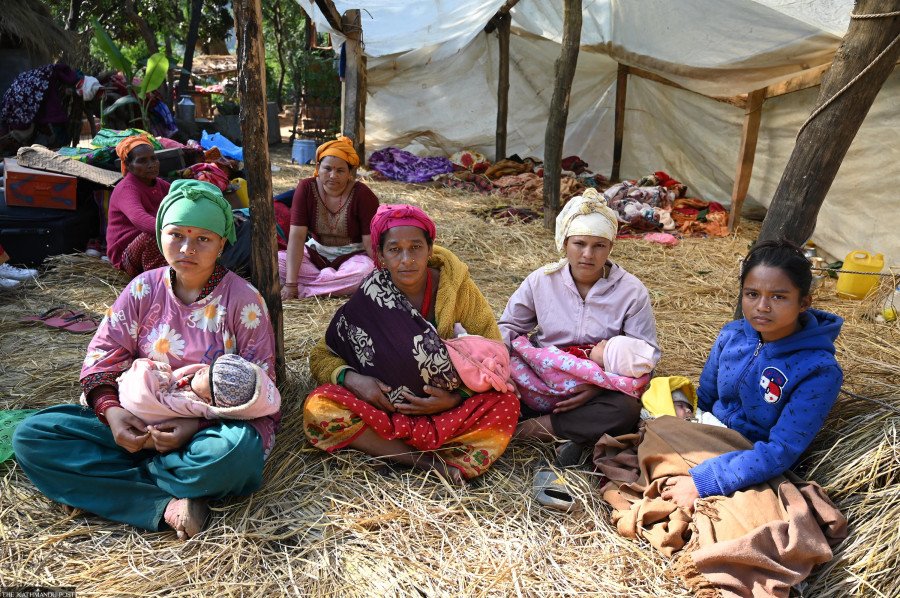Health ministry officials say children in the districts will be given an additional dose each of measles-rubella and polio vaccines.

With the threat of infectious as well as vaccine-preventable diseases looming in the quake-affected districts, the National Immunisation Advisory Committee has asked the Ministry of Health and Population launch an additional drive against vaccine-preventable diseases.
Officials said that the expert panel also recommended the ministry to launch a drive against measles and rubella, polio, cholera, pneumonia, and influenza, among others.
“As per the panel’s recommendation, we have already started risk-mapping with the help of provincial and local governments,” said Dr Prakash Budhathoki, spokesman for the Health Ministry.
At least 153 people died, hundreds were injured and thousands were displaced by the magnitude 6.4 earthquake that rocked Nepal and parts of India at midnight on November 3. Nepal’s Jajarkot and West Rukum districts in Karnali Province suffered heavy damage.
“We have been also discussing rescheduling the measles-rubella campaign, which is slated for 2024, to an earlier date in quake-hit areas,” said Budhathoki. “Although regular vaccination campaigns cover the quake-affected areas, we are concerned about the risk of disease outbreaks after the earthquake.”
Public health experts have warned of outbreaks of communicable and vaccine-preventable diseases in the quake-hit areas, as thousands of people have been rendered homeless, and health and hygiene of the displaced people have been compromised. Officials concede that preventing possible outbreaks in the coming days will be challenging, as people are forced to live out in the open amid growing cold.
Officials at the Health Ministry said that an outbreak of communicable diseases—cold-related ailments, waterborne diseases and vaccine-preventable diseases—is likely in the coming days due to falling temperatures and damaged infrastructure. They said that they have held several rounds of discussions at the Health Ministry and agreed on measures to be taken in the coming days.
Along with houses, toilets were also destroyed in the quake. Officials say the destruction of toilets increases open defecation, which risks contamination of water sources. Jajarkot witnessed the worst diarrhoea outbreak in 2009, in which 111 people died and over 6,000 were infected. In 2014 and 2016 also, an outbreak of cholera was recorded in the district.
There is also the risk of spread of vector-borne diseases such as malaria, dengue, kala-azar and scrub typhus, among others, experts say.
Nepal saw a surge in scrub typhus cases after the 2015 earthquakes, which killed nearly 9,000 people. Three months after the twin earthquakes, the BP Koirala Institute of Health Sciences, Dharan had alerted the Epidemiology and Disease Control Division on six cases of children with unusual fever and severe respiratory features.
Over 4,000 people have been infected with the disease since January this year.
Officials said that the ministry has started risk-mapping to launch measles and rubella drive in the quake-hit districts—Jajarkot and West Rukum.
Measles is a highly contagious viral disease transmitted through fluids from the nose, mouth or throat of an infected person. It can be potentially deadly for the unvaccinated people.
Nepal had committed to eliminating measles by 2023 after missing the earlier deadline of 2019. To declare measles as eliminated, the number of cases should be less than five per 1,000,000 people throughout the year.
However, the deadly virus was reported in over 14 districts across the country at the start of 2023. At least one child died and hundreds were infected with the disease.
An outbreak of the virus has been confirmed in the Kathmandu Valley, which shows a significant gap in Nepal's routine vaccination programme. The Nepal Demographic and Health Survey-2022, carried out by the Ministry of Health and Population, shows that four percent of children in the 12–23 month age group have not been vaccinated.
This figure was just one percent in 2016, and the rapid surge in the number of unvaccinated children poses a serious threat to the country’s achievements in immunisation made over the years through huge investments, child health experts warn.
The Ministry of Health and Population has now extended the deadline of measles elimination to 2026.











